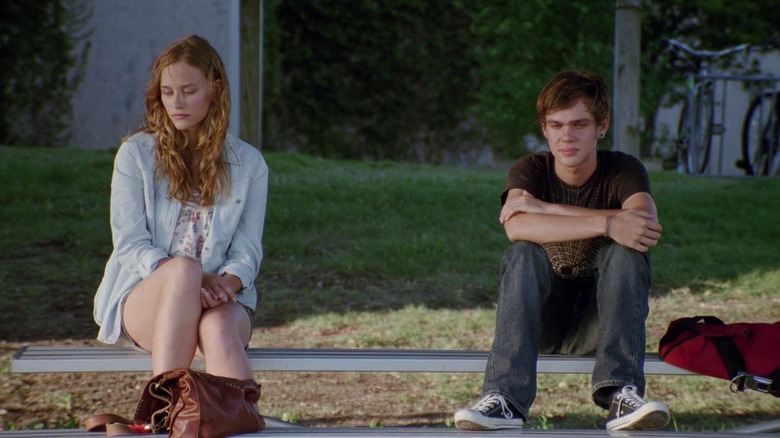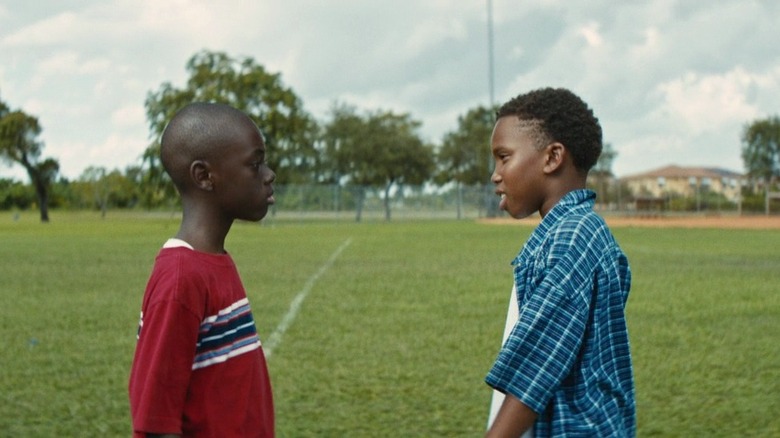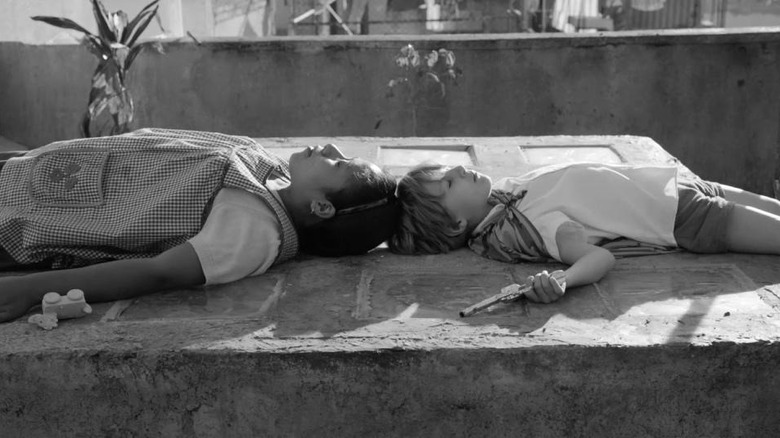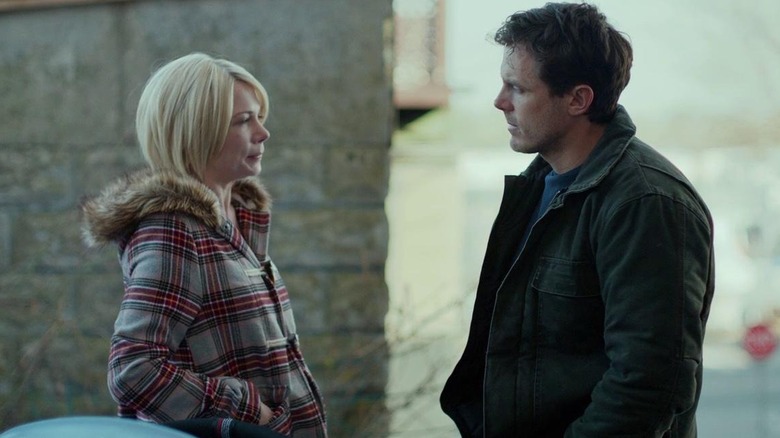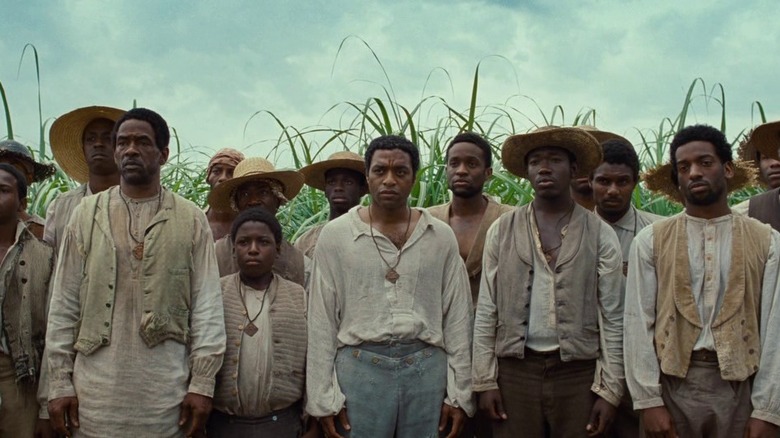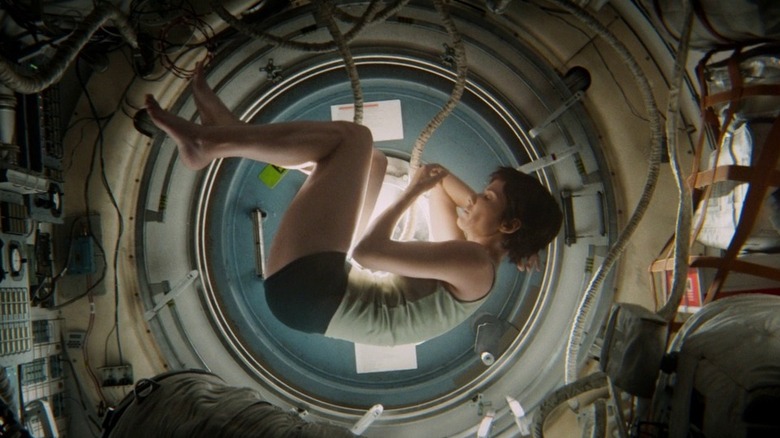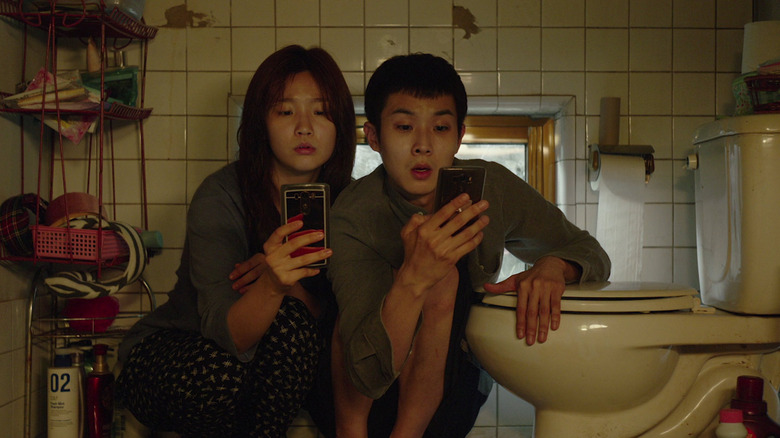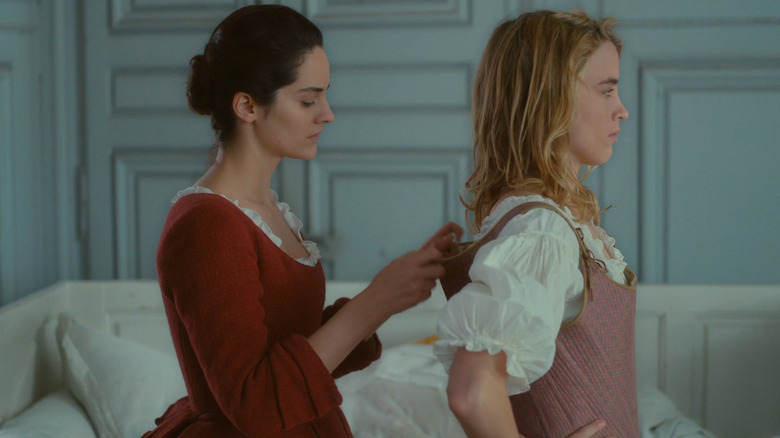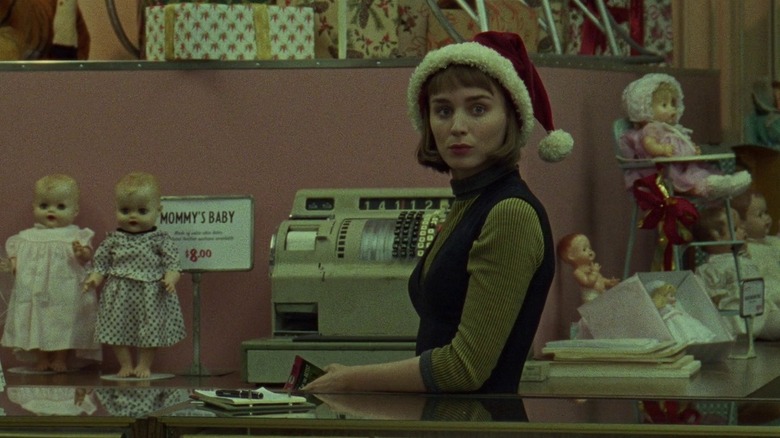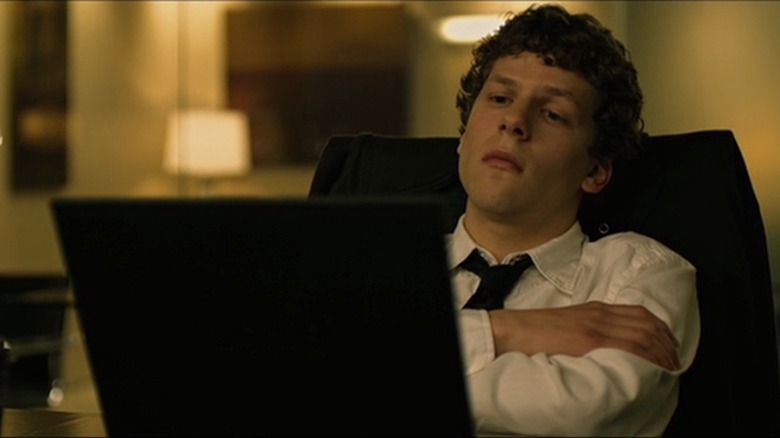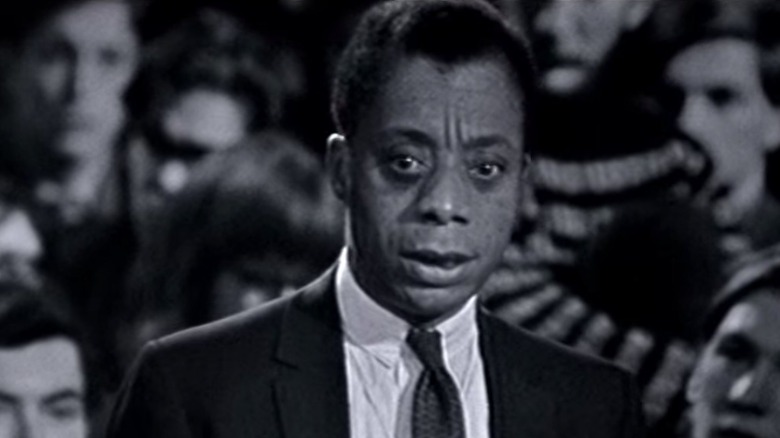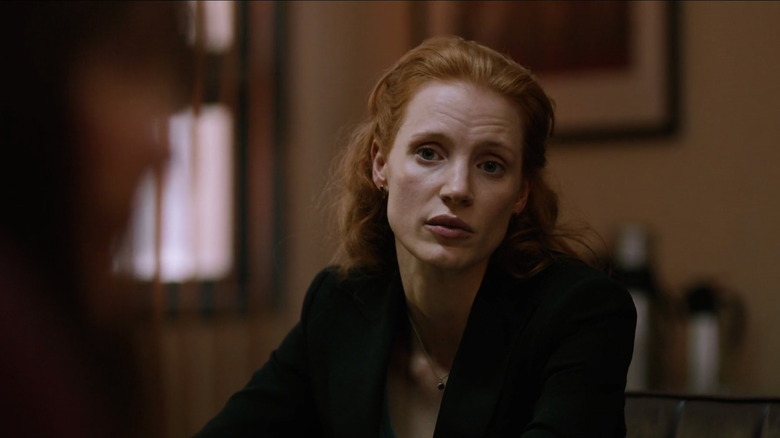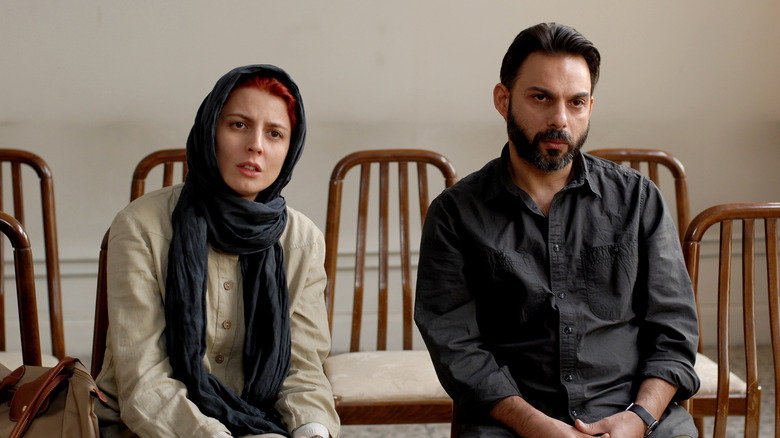These Are The 13 Best Movies Of The 2010s According To Metacritic
There's no doubt that recent years have brought out some amazing cinema — the type of films that, upon watching, you know will stand the test of time. When you think about the best films that came out in the 2010s, you may think of titles such as the mesmerizing "Call Me By Your Name," or the whimsically beautiful "La La Land." Or maybe the first film to come to mind is Pixar's ultra clever "Inside Out," or, at the other end of the spectrum, the war epic "Dunkirk."
While each of these films is undeniably fantastic, and could very well be considered "classics" in years to come, they are not quite the best of the best — at least not according to Metacritic standards. The site compiles numerous reviews for individual films and generates an average Metascore, between 0 and 100, meant to represent the title's overall quality. The higher the score, the better the film, according to the site.
Each of the films noted above has very high Metacritic scores — just not high enough to make this list. Each of the following films has a Metacritic score of 95 or above, making them the very best of the decade. Here's a rundown of those near-perfect films.
Boyhood (2014)
As the only film on this list with a perfect Metascore of 100, "Boyhood" has a lot of hype to live up to. Directed and written by Richard Linklater (writer-director of films such as "Dazed and Confused" and the "Before" trilogy), 2014's "Boyhood" was filmed over the course of a whopping — and rare in the realm of film production — 12 years. Linklater began with just an initial outline and wrote each section of the characters' lives along the way (via No Film School). The result is an authentic, visceral depiction of growing up.
The film follows Mason Evans, Jr. (Ellar Coltrane), who, at the beginning of the film set in 2002, is just 6 years old. The plot follows Mason through the next 12 years of his life, as he navigates family, romance and everything else that comes with adolescence. Ethan Hawke and Patricia Arquette co-star as Mason's divorced parents, Mason Sr. and Olivia.
The film received a ton of accolades, including six Academy Award nominations and a Best Supporting Actress win for Arquette. Amongst the mass amount of praise, however, the beauty and remarkable nature of the film is summed up nicely by Flavorwire. Their review reads, "'Boyhood' reveals itself as something deeper, more noteworthy and ambitious than even its remarkable production would suggest, for Linklater has given us nothing less than a cinematic approximation of human memory."
Moonlight (2016)
Barry Jenkins' "Moonlight" is a film so achingly good that it's hard to put into words a description of its brilliance. Not that that stopped critics from trying — and succeeding — to explain just how mesmerizing the film is. The New York Times writes of the film's "radical, revelatory power," while the New Yorker declares that it "undoes our expectations as viewers, and as human beings, too."
The story follows Chiron, a young gay Black man growing up in Miami, through three distinct interludes of his life. It begins with Chiron as a kid — played by Alex Hibbert, the first of the three actors to take on this character — confused by his desires and sexuality. It moves on to his teenage years, where he's played by Ashton Sanders, as he begins to come into himself more and even has his first sexual experience. It concludes with Chiron as a young adult, portrayed by Trevante Rhodes, as he still struggles deeply with accepting who he is.
Each actor takes on the role of Chiron in their own ways, with their own power, while at the same time seamlessly sharing the same character. The authenticity of Chiron's world is filled out by a stellar supporting cast, from the three actors who play Chiron's friend and love interest Kevin — Jaden Piner, Jharrel Jerome, and André Holland — to his complicated addict mother, played by Naomie Harris. Of course, Mahershala Ali's Oscar-winning turn as Juan, the drug dealer who becomes a mentor and father figure to Chiron, is also unforgettable.
Roma (2018)
Set in 1970s Mexico City, Alfonso Cuarón's "Roma" follows Cleo (Yalitza Aparicio), a young woman who works as a live-in maid for the middle-class household of couple Sofia (Marina de Tavira) and Antonio (Fernando Grediaga), along with their four children and Sofia's mother Teresa (Verónica García). When Cleo becomes pregnant from her boyfriend — who refuses to acknowledge the baby — at the same time that Antonio suddenly runs away with his young mistress, Cleo finds herself bonding more with Sofia and the rest of the family.
Many critics have noted that "Roma," with a Metacritic score of 96, is simultaneously an intimate portrait and a grandiose piece of filmmaking. International Cinephile Society calls the film "quietly spectacular" and declares that Cuarón achieves the feat of "pairing technical virtuosity and universal human decency to a maximum impact." Similarly the New York Times points out, "Cuarón uses one household on one street to open up a world, working on a panoramic scale often reserved for war stories, but with the sensibility of a personal diarist."
The NYT also calls the film a "masterpiece" and is far from the only outlet to use that word. Upon watching "Roma," it's clear why.
Manchester by the Sea (2016)
Written and directed by Kenneth Lonergan, "Manchester by the Sea" tells the story of Lee Chandler (Casey Affleck), who, after the death of his brother Joe, learns that the latter has made him the sole guardian of Joe's son, Patrick (Lucas Hedges). Upon returning to Manchester-by-the-Sea, the fishing village where he's from, to take care of Patrick, Lee is forced to face his traumatic past and his estranged ex-wife Randi (Michelle Williams).
The film was nominated for a huge string of awards, including six Academy Award nods in almost all the major categories. Of the six, Affleck won for Best Actor and Lonergan won for Best Original Screenplay. Both wins likely align with the experience the viewer has watching the film: Lee's world is so intricately constructed and Affleck takes on the role with keen skill, achievements reflected in its 96 score on Metacritic.
In its rave review, The Australian wrote, "Not a moment in the film is wasted; though on the long side, this is from start to finish a rewarding and strangely beautiful drama with a conclusion that is immensely satisfying in its touching understatement."
12 Years a Slave (2013)
Based on the 1853 memoir "Twelve Years a Slave" by Solomon Northup, this film adaptation and Best Picture winner is a striking portrait of a real man's horrific reality back in the years before the Civil War. Written for the screen by John Ridley and directed by Steve McQueen, "12 Years a Slave" tells the story of Solomon (Chiwetel Ejiofor), a free Black man living in upstate New York, where slavery is abolished. But when Solomon is suddenly kidnapped, he gets sold back into slavery, suddenly facing the cruelty of not only his circumstances but of a brutal master named Edwin (Michael Fassbender). After 12 years of this life, Solomon finally faces a chance to escape.
Much of the film's praise went directly to McQueen, whose firm grasp on the subject and presentation of this difficult storyline is thoughtful and memorable enough for a 96 score on Metacritic. A review by Nijla Mu'min details how McQueen makes a point of "never [shying] away from frames that capture the ways that beauty exists in the most painful situations."
Additionally, the cast members do incredible work, making the deep authenticity of the film even more nuanced and compelling. The Independent Critic writes about Ejiofor's Oscar-nominated portrayal, "It seems impossible to think of anyone turning in as fine a performance as Ejiofor does here." In reference to Oscar winner Lupita Nyong'o, The Guardian calls her a "revelation" and her performance "the most bold feature debut by an actress in recent memory."
Gravity (2013)
Carrying a film essentially on your own is no small feat for an actor. But with "Gravity," lead actor Sandra Bullock proves herself more than capable. Directed by Alfonso Cuarón — who also co-wrote the screenplay with Jonás Cuarón — "Gravity" centers on Dr. Ryan Stone (Bullock), a medical engineer, as she begins on her first in-space shuttle mission. Aided by veteran astronaut Matt Kowalsky (George Clooney), their mission soon goes disastrously awry, putting them both in imminent danger. With their shuttle destroyed, the two quickly realize they're stranded in the middle of space and — in a key, early narrative plot point — Ryan is soon left on her own.
Moviegoers who experienced "Gravity" were likely not surprised when the film won seven of the 10 Academy Awards it was nominated for, including Best Director, Cinematography, Film Editing, Original Score, Sound Editing, Sound Mixing and Visual Effects. It's the kind of technically ambitious film that is bound to win all of the technical wins, but the real impact of "Gravity" is more than just a visual (and auditory) feat –as indicated by its Metacritic score of 96.
Flavorwire's critic had an intense reaction to the film, writing, "It is a big, bold picture that refuses to be timid, and it left me trembling. It's not just a film; it's something that happens to you." It's the kind of reaction that one can only imagine was exactly Cuarón's intention: to fully immerse the viewer in the magical, if also terrifying, world of deep space, right alongside Bullock.
Parasite
"Parasite" became the first non-English language film to ever win the Academy Award for Best Picture, but even that groundbreaking feat doesn't convey exactly how much of a triumph this film from director Bong Joon-ho really is. In what has been called a career best for Joon-ho — a director who has already proven his undeniable talent with film such as "Snowpiercer" and "Okja" — "Parasite" will pull you in and surprise you at every turn, even when you're sure you have a grasp on what's happening. This isn't even to mention the ultra sharp commentary, themes and symbolism constantly at play that landed this a 96 score on Metacritic.
It follows the struggling Kim family, who, living in a semi-basement apartment, fold pizza boxes for extra income to stay afloat. When the Kims' son, Ki-woo (Choi Woo-shik), gets a job tutoring the daughter of the wealthy Park family, the Kims scheme to all get jobs in the Parks' affluent home. In a compelling look into class inequality, greed and power, the Kims' newly found comfort also becomes threatened.
While "Parasite" is a film that's difficult to fully sum up, The Guardian comes close in its review, calling it "a tragicomic master class that will get under your skin and eat away at your cinematic soul." CultureMap points out exactly how this film is a "master class," in that it excels at the difficult feat of entertaining "the masses while telling a deep and meaningful story."
Portrait of a Lady on Fire (2019)
Written and directed by French filmmaker Céline Sciamma, "Portrait of a Lady on Fire" offers an up close and personal look into the intimacy between two lovers in a visually stunning slow burn that earned it a 95 on Metacritic. Set on an island off the coast of France in 1770, the story follows Marianne (Noémie Merlant), a young painter who is commissioned to paint the wedding portrait of a rebellious soon-to-be bride named Héloïse (Adèle Haenel). In the midst of this assignment, Marianne and Héloïse fall deeply in love.
A beautiful love story deserves beautiful visual imagery, which is exactly what director Sciamma and cinematographer Claire Mathon deliver. Entertainment Weekly pointed to this in its review, writing, "There's almost no single moment in 'Portrait of a Lady on Fire' that couldn't be captured, mounted, and hung on a wall as high art." Merlant and Haenel give excellent performances, both individually and especially together — their chemistry leaps off the screen and keeps you ardently rooting for them even when you sense that they only have a tragic ending ahead of them.
Speaking of endings, "Portrait of a Lady on Fire" delivers one of the most memorable final shots of recent cinema. On this note, Vulture writes that the film "builds and builds and builds, as we keep waiting for an explosion, a big emotional climax. And ... it arrives with the very last shot — which I won't reveal other than to say it's one of the finest pieces of acting and one of the most moving images I've seen in eons."
Carol (2015)
Based on the novel "The Price of Salt" by Patricia Highsmith, "Carol" was adapted by Phyllis Nagy for the screen and directed by Todd Haynes. Set in 1950s Manhattan, "Carol" follows the romantic relationship between the titular character (Cate Blanchett), a middle aged woman in the midst of a messy divorce with her husband, and a young aspiring photographer named Therese (Rooney Mara).
Both lead actors excel in depicting two characters whose outer lives have to differ from their inner lives. Getting to see their lives outside of each other — Carol with her estranged marriage and Therese with her boyfriend who is eager to get married — only makes their connection more palpable once they do come together.
Reflecting the film's overall score of 94 on Metacritic, Empire enthused in its review, "Mara and Blanchett make for an unforgettable couple in a beautiful film about longing, loss and the confusion and wonder of love."
The Social Network (2010)
Mark Zuckerberg is one of the most famous entrepreneurs out there today and the 95-scoring "The Social Network" offers a brilliant peek behind the curtain of the man behind the news headlines. Written by Aaron Sorkin and directed by David Fincher, "The Social Network" begins in 2003 when Zuckerberg was still a student at Harvard. From there — and jumping between timelines — we see the creation of Facebook from its roots and how it led to Zuckerberg landing on the receiving end of two major lawsuits in relation to his growing social media site.
As one of the oldest films on this list, we can say that "The Social Network" has aged well 11 years after its release. Watching it now, the observations seem more keen, the writing just as sharp and the depiction of Zuckerberg all the more telling.
But, in general, the merits of this film are just so high that the Hollywood Reporter called it "mesmerizing." Further, it's so rich of a story that the Chicago Reader proclaimed it a "masterful social drama."
I Am Not Your Negro (2017)
The only documentary on this list with a Metacritic tally of 95, "I Am Not Your Negro" is a searing social critique based on the unfinished manuscript "Remember This House" by James Baldwin. Narrated by Samuel L. Jackson, "I Am Not Your Negro" — which was adapted for the screen by the director, Raoul Peck — explores racism in America through the lens of the deaths of three of Baldwin's close friends: Medgar Evers, Malcolm X and Martin Luther King, Jr.
In terms of documentaries, this one hits all the marks of what a great one should be. Beyond being a standout of its genre, it also integrates the work of a literary great in Baldwin. On this topic, Spirituality and Health writes, "Baldwin's fury and his despair come through in vivid fashion, making this film not just an important social document, but an essential work of art." Putting it plainly, NME calls it "an extraordinary visual essay" that manages to condense "decades — centuries, in fact — of black history into 95 minutes."
Ever-timely and ever-fascinating, "I Am Not Your Negro" is a shining example of the power of the documentary.
Zero Dark Thirty (2013)
The attack on 9/11 is undoubtedly one of the defining moments of recent history, which led to yet another one: the takedown of Osama bin Laden, leader of terrorist network Al-Qaeda, after a decade-long search. The hunt and his death are depicted in 2013's "Zero Dark Thirty," written by Mark Boal and directed by Kathryn Bigelow (notable as the only woman to have ever won the Oscar for Best Director until Chloe Zhao's recent win), and centers on fictional CIA intelligence analyst Maya Harris (Jessica Chastain) in the process of finding bin Laden.
Critics up and down the board agreed that as a thriller, it's a near perfect example of the genre. MovieFreak.com calls it "one of the great cinematic procedurals ever made," while the San Diego Reader writes, "When it comes to establishing and maintaining tension, there wasn't a better American genre picture released this year." Its Metacritic score is 95.
More generally, Flavorwire insists it has all of the makings of a great movie experience, calling the film "complicated, nuanced, searching, piercing, difficult — and yet thrilling and satisfying all the same." Beyond these complimentary adjectives, "Zero Dark Thirty" is also immersive and memorable — all in all, it's no wonder it earned its place on this list.
A Separation (2011)
One of the few foreign films on this list, alongside "Parasite" and "Portrait of a Lady on Fire," "A Separation" is a beautiful piece of cinema from Iran. Written and directed by Asghar Farhadi, "A Separation" centers on an estranged couple, Nader (Payman Maadi) and Simin (Leila Hatami), who are at odds with each other in regards to their marriage. Nader is refusing a separation, resulting in Simin suing Nader for a divorce with the intention of pursuing a better life for their daughter abroad. Further complicating things, Nader finds himself in another court battle when an abusive act against his father's pregnant caregiver, Razieh (Sareh Bayat), ends in a miscarriage and Razieh and her husband sue.
Very much a character study, the power of "A Separation" lies in the compellingly complicated relationships of these two marriages and the ways in which they intersect. While it's a character study at its core, smart filmmaking brings a depth to "A Separation" that makes it feel like much more. The Atlantic wrote, "Dynamically shot and paced like a thriller, the film has the density and moral prickliness of a good novel."
Moreover, the writing articulates its themes and messages flawlessly, delivered through the actions of these nuanced characters. Variety called it, "Tense and narratively complex, formally dense and morally challenging." With a Metacritic score of 95, it has the one key characteristic that arguably each of the films on this list has: staying power.

